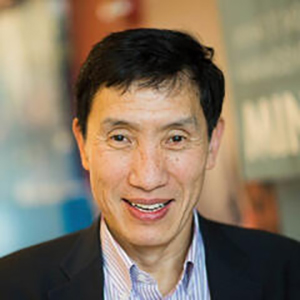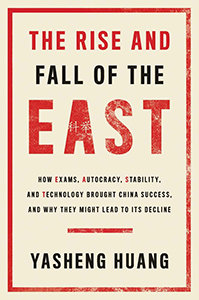Interview with Yasheng Huang


Yasheng Huang
author of "The Rise and Fall of the EAST: How Exams, Autocracy, Stability, and Technology Brought China Success, and Why They Might Lead to Its Decline"

Michael Carter
Co-Host
Yasheng Huang, author of "The Rise and Fall of the EAST: How Exams, Autocracy, Stability, and Technology Brought China Success, and Why They Might Lead to Its Decline"
Yasheng Huang's Website
Yasheng Huang is a Professor and holds the Epoch Foundation Professorship of Global Economics and Management at MIT Sloan School of Management. From 2013 to 2017, he served as an Associate Dean in charge of MIT Sloan’s GlobalPartnership programs and its Action Learning initiatives. His previous appointments include faculty positions at the University of Michigan and at Harvard Business School.
Professor Huang is the author of 11 books in both English and Chinese and of many academic papers (such as on regulatory transparency, historical autocracy, statistical falsifications, tax, financing, sectoral and regulatory biases, history of reforms and strategy, political economy of controls, etc.) His book, The Rise and Fall of the EAST: How Exams, Autocracy, Stability, and Technology Brought China Success, and Why They Might Lead to its Decline, will be published by Yale University Press in 2023. He is collaborating with other scholars on a book project, Reframing The Needham Question, based on a comprehensive database on Chinese historical inventions (under contract at Princeton University Press). His book, Statism with Chinese Characteristics (under contract at Cambridge University Press), examines economic reforms and economic performance of China since 1978. Professor Huang is a Co-Principal Investigator in a large-scale multi-disciplinary research project on food safety in China.
Outside of his academic research, Professor Huang has written for New York Times, Wall Street Journal, Financial Times, Foreign Policy and Foreign Affairs, and Project Syndicate, Caixin and Caijing. He is working on several policy projects related to US-China relations. He was one of the coauthors of MIT’s report, “University Engagement with China: An MIT Approach” and he is a co-chair of an implementation committee of that report. He is a member of a taskforce at Asia Society on US-China policy and a member of Brookings-CSIS Advisory Council on Advancing US-China collaboration. During 2023-4, he is a visiting fellow at the Kissinger Institute at the Woodrow Wilson Center in Washington DC.
Professor Huang founded and runs China Lab, ASEAN Lab and India Lab, which have provided low-cost consulting services to hundreds of small and medium enterprises in these countries. From 2015 to 2018, he ran a program in Yunnan province to train women entrepreneurs (funded by Goldman Sachs Foundation). He has held or received prestigious fellowships such as the National Fellowship at Stanford University and the Social Science Research Council-MacArthur Fellowship. The National Asia Research Program named him one of the most outstanding scholars in the United States conducting research on issues of policy importance to the United States. He has served as a consultant at World Bank, Asian Development Bank, and OECD, and serves on advisory and corporate boards of non-profit and for-profit organizations. He is a founding member and is serving as the president of Asian American Scholar Forum, an NGO dedicated to open science, protection of rights and well-being of Asian American scholars.
The Book: "The Rise and Fall of the EAST: How Exams, Autocracy, Stability, and Technology Brought China Success, and Why They Might Lead to Its Decline"
ISBN: 0300266367
Get the bookThe long history of China’s relationship between stability, diversity, and prosperity, and how its current leadership threatens this delicate balance
Chinese society has been shaped by the interplay of the EAST—exams, autocracy, stability, and technology—from ancient times through the present. Beginning with the Sui dynasty’s introduction of the civil service exam, known as Keju, in 587 CE—and continuing through the personnel management system used by the Chinese Communist Party (CCP)—Chinese autocracies have developed exceptional tools for homogenizing ideas, norms, and practices. But this uniformity came with a huge downside: stifled creativity.
Yasheng Huang shows how China transitioned from dynamism to extreme stagnation after the Keju was instituted. China’s most prosperous periods, such as during the Tang dynasty (618–907) and under the reformist CCP, occurred when its emphasis on scale (the size of bureaucracy) was balanced with scope (diversity of ideas).
Considering China’s remarkable success over the past half-century, Huang sees signs of danger in the political and economic reversals under Xi Jinping. The CCP has again vaulted conformity above new ideas, reverting to the Keju model that eventually led to technological decline. It is a lesson from China’s own history, Huang argues, that Chinese leaders would be wise to take seriously.